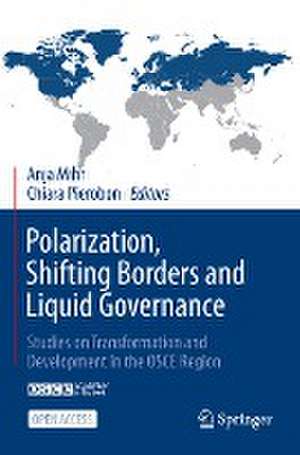Polarization, Shifting Borders and Liquid Governance: Studies on Transformation and Development in the OSCE Region
Editat de Anja Mihr, Chiara Pierobonen Limba Engleză Paperback – 27 dec 2023
This open-access book explores the security dynamics amid the polarization, shifting borders, and liquid governance that define the Zeitenwende era in Europe's eastern neighbourhood and Central Asia. Presenting various case studies, the volume unveils the intricate web of border dynamics and practices, including the nuanced interplay of border disputes within the Organization for Security and Cooperation in Europe (OSCE) member states. The contributions shed new light on how contested borders and liquid modes of governance have impacted the engagement of international organizations such as the European Union (EU), North Atlantic Treaty Organization (NATO), and OSCE in security crises and conflict prevention. Delving deeper, a special part dissects the ongoing Russia-Ukraine conflict and examines European and international responses. By analyzing the stances of diverse European countries, their neighborhood, and international organizations, this section uncovers commonalities and disparities in their approaches to the Ukrainian crisis.
| Toate formatele și edițiile | Preț | Express |
|---|---|---|
| Paperback (1) | 360.92 lei 6-8 săpt. | |
| Springer Nature Switzerland – 27 dec 2023 | 360.92 lei 6-8 săpt. | |
| Hardback (1) | 434.30 lei 6-8 săpt. | |
| Springer Nature Switzerland – 27 dec 2023 | 434.30 lei 6-8 săpt. |
Preț: 360.92 lei
Nou
Puncte Express: 541
Preț estimativ în valută:
69.10€ • 70.89$ • 58.18£
69.10€ • 70.89$ • 58.18£
Carte tipărită la comandă
Livrare economică 26 februarie-12 martie
Preluare comenzi: 021 569.72.76
Specificații
ISBN-13: 9783031445866
ISBN-10: 3031445864
Pagini: 427
Ilustrații: XVII, 427 p. 18 illus., 5 illus. in color.
Dimensiuni: 155 x 235 mm
Greutate: 0.62 kg
Ediția:1st ed. 2024
Editura: Springer Nature Switzerland
Colecția Springer
Locul publicării:Cham, Switzerland
ISBN-10: 3031445864
Pagini: 427
Ilustrații: XVII, 427 p. 18 illus., 5 illus. in color.
Dimensiuni: 155 x 235 mm
Greutate: 0.62 kg
Ediția:1st ed. 2024
Editura: Springer Nature Switzerland
Colecția Springer
Locul publicării:Cham, Switzerland
Cuprins
Chapter 1. Migration Policies in the OSCE Region (Anisa Abeytia).- Chapter 2. Early Warning Models in the OSCE: Adoption and Re-Invention (Alina Isakova).- Chapter 3. NATO and EU Strategic Security Environment (Aybike Yalcin-Ispir).- Chapter 4. Patterns of Border Disputes Amongst OSCE Countries (Halina Sapeha).- Chapter 5. Assessing Water (Ir)Rationality in the Disputed Region of Nagorno-Karabakh (Leonardo Zanatta).- Chapter 6. Vetting as a Tool for Strengthening Judicial Integrity in the OSCE Region (Teodora Miljojkovic).- Chapter 7. Human Rights Adjudication in Central Asia (Saniia Toktogazieva).- Chapter 8. Human Rights and Social Media: Challenges and Opportunities for Human Rights Education (Joanna Kulesza).- Chapter 9. Digital Citizen Activism in Central Asia: Beyond Contestation and Cooperation (Bakhytzhan Kurmanov).- Chapter 10. The Dilemma of Good Governance vs. Power Grab in Georgia (Shalva Dzebisashvili).- Chapter11. Transformations of Georgia, Moldova, and Ukraine towards EU Membership (Malkhaz Nakashidze).- Chapter 12. Backsliding Rule of Law and “Stabilotocracy” in Montenegro (Mirko Đuković).
Notă biografică
Anja Mihr is DAAD Associate Professor at the OSCE Academy in Bishkek, Kyrgyzstan. She is Professor of Human Rights, Governance, Public Policy, and Transitional Justice and developed training courses on ‘Transitology’. Anja is also Founder and Program Director of the Center on Governance through Human Rights at the Berlin Governance Platform in Berlin, Germany. She has held professorships at the Willy-Brandt School of Public Policy, Erfurt University, Germany, and the Netherlands Institute of Human Rights (SIM), University of Utrecht, Netherlands.
Chiara Pierobon is DAAD Visiting Professor at the University of Washington in Seattle, USA, where she teaches German and European Studies. She has held professorships and academic appointments at the American University of Central Asia (Kyrgyzstan), Bielefeld and Magdeburg University (Germany), German Kazakh-University (Kazakhstan), Kyrgyz-National University (Kyrgyzstan), Malaya University (Malaysia), St. Petersburg State University (Russia), and University of California/Berkeley (USA). In addition, Dr. Pierobon has been active as Consultant and Trainer in organizations, NGOs, and think tanks such as DVV International, Europe-Asia Monitoring (EUCAM), the European Neighborhood Council (ENC), and the UNESCO Cluster Office for Central Asia.
Chiara Pierobon is DAAD Visiting Professor at the University of Washington in Seattle, USA, where she teaches German and European Studies. She has held professorships and academic appointments at the American University of Central Asia (Kyrgyzstan), Bielefeld and Magdeburg University (Germany), German Kazakh-University (Kazakhstan), Kyrgyz-National University (Kyrgyzstan), Malaya University (Malaysia), St. Petersburg State University (Russia), and University of California/Berkeley (USA). In addition, Dr. Pierobon has been active as Consultant and Trainer in organizations, NGOs, and think tanks such as DVV International, Europe-Asia Monitoring (EUCAM), the European Neighborhood Council (ENC), and the UNESCO Cluster Office for Central Asia.
Textul de pe ultima copertă
This open-access book explores the security dynamics amid the polarization, shifting borders, and liquid governance that define the Zeitenwende era in Europe's eastern neighbourhood and Central Asia. Presenting various case studies, the volume unveils the intricate web of border dynamics and practices, including the nuanced interplay of border disputes within the Organization for Security and Cooperation in Europe (OSCE) member states. The contributions shed new light on how contested borders and liquid modes of governance have impacted the engagement of international organizations such as the European Union (EU), North Atlantic Treaty Organization (NATO), and OSCE in security crises and conflict prevention. Delving deeper, a special part dissects the ongoing Russia-Ukraine conflict and examines European and international responses. By analyzing the stances of diverse European countries, their neighborhood, and international organizations, this section uncovers commonalities and disparities in their approaches to the Ukrainian crisis.
Caracteristici
This book is open access, which means that you have free and unlimited access Highlights polarization politics and challenges for further integration in the OSCE region Includes a special section on the ongoing crisis and war in Ukraine since 2022 Addresses the broader areas of transformation and development in the OSCE region
